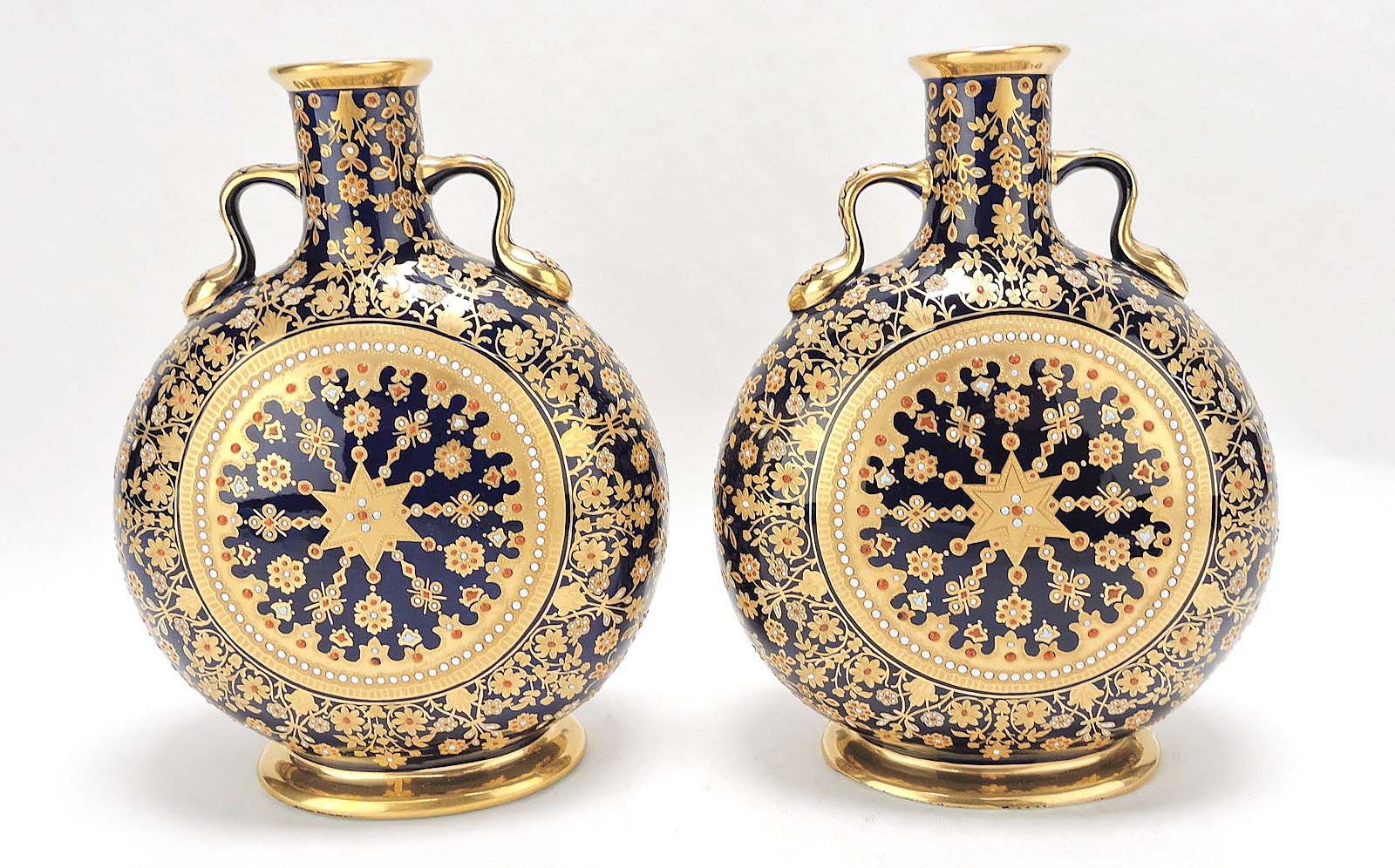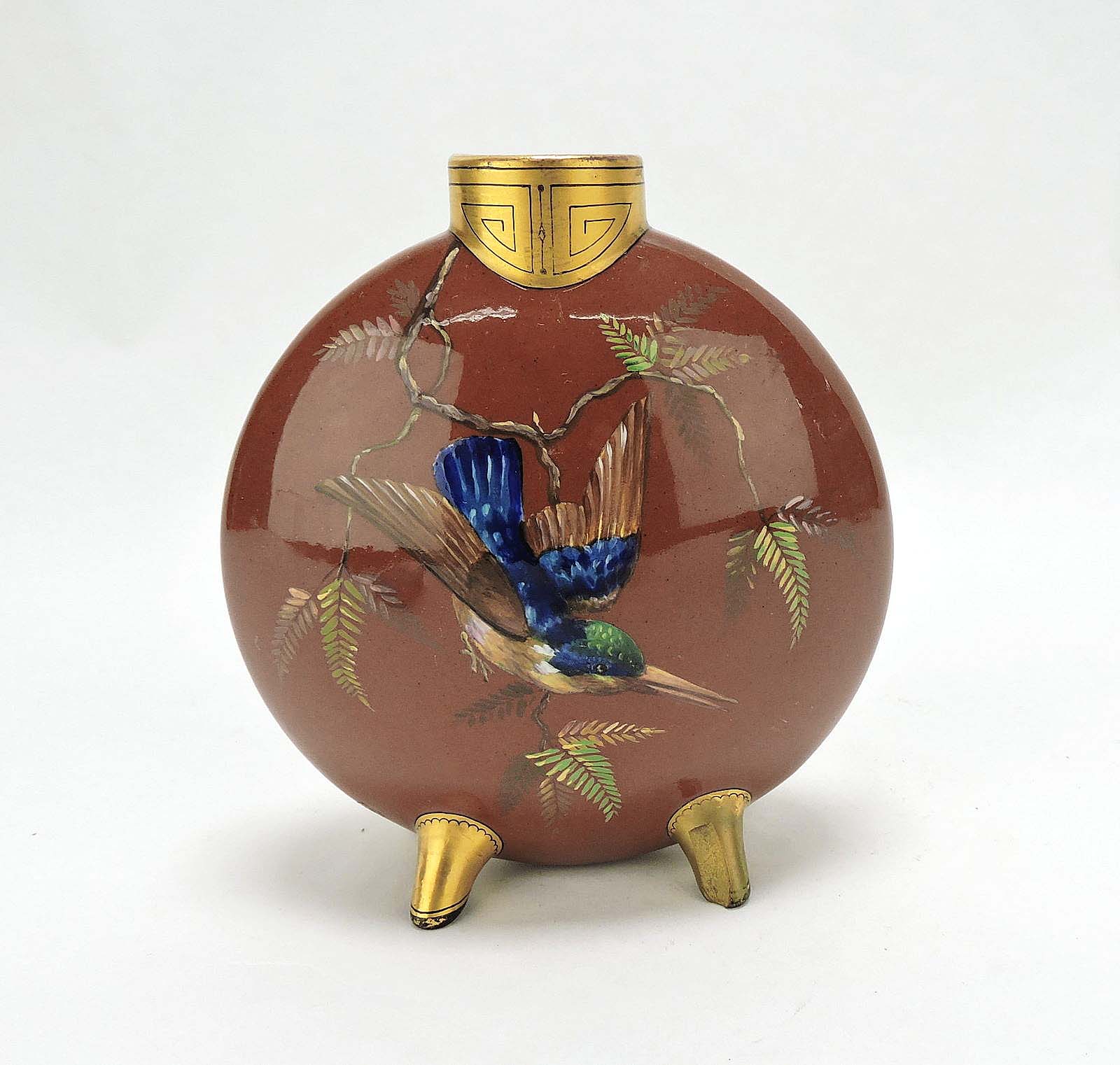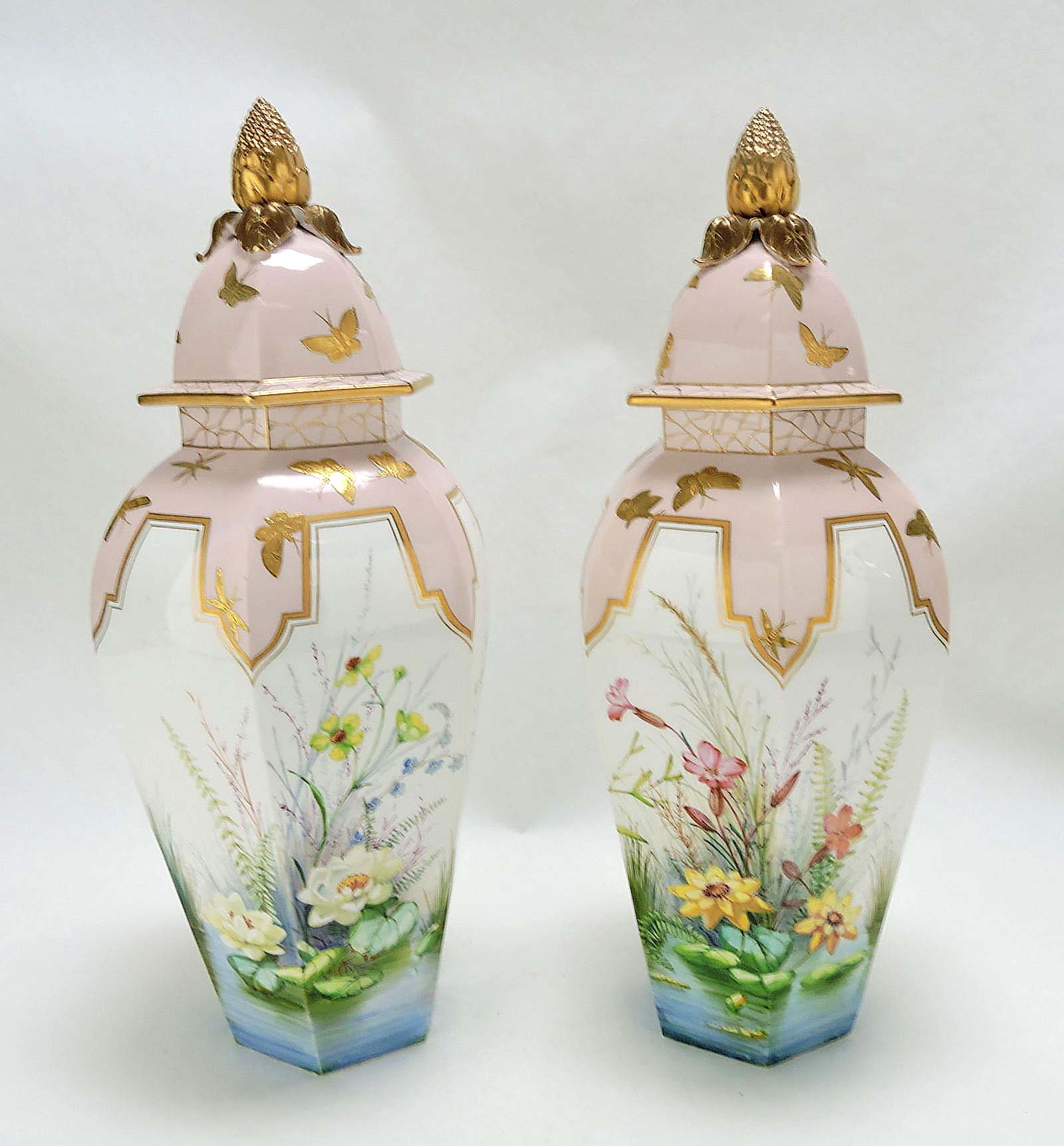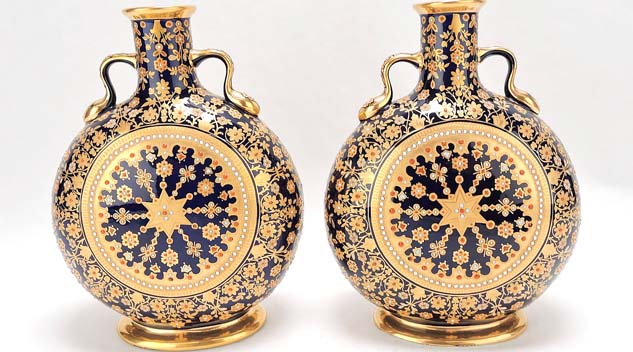#Strawser #Finds #Fortune #Fortunoff #Collection #Antiques #Arts #Weekly

Leading the sale was a pair of Aesthetic Movement twin-handled moon flasks, circa 1875, 9½ inches tall, which were decorated with a 22K gold gilded floral motif; they bloomed to $4,340, more than doubling their high estimate ($1,5/2,000).
Review by Kiersten Busch
WOLCOTTVILLE, IND. — In an auction description found on Strawser Auction Group’s LiveAuctioneers page, it was noted, “Anyone who grew up in the New York-New Jersey metropolitan area will recognize the name Fortunoff, the high-end retailer of housewares, silverware, lighting fixtures and jewelry. Few are probably aware, however, that the matriarch of the Fortunoff family, Helene Fortunoff (1933-2021), was a passionate collector of fine antique ceramics.” On November 7, the firm conducted an online-only sale of the Fortunoff collection of Nineteenth Century Aesthetic Movement porcelain. The 243 lots offered were a balance of the collection that Fortunoff assembled with her second husband, Robert Grossman.
Leading the sale, at $4,340, was a pair of Aesthetic Movement twin handled moon flasks. The circa 1875 pieces were cataloged as “rare,” “stunning” and “exhibition quality” and were “profusely decorated” with a 22K gilded floral motif and beaded jewels. This pair, as well as every other ceramic piece mentioned below, had provenance to Nick Boston Antiques, London, and were also cataloged by Boston.
Moon flasks were abundant in the Fortunoff collection, with another pair, these from Minton and done in turquoise glazed porcelain, surpassing their $600/700 estimate to earn $3,720. The circa 1875 flasks were decorated with enameled blossoms. Another Minton moon flask, this example done in glazed terracotta, was designed by British designer Christopher Dresser (1834-1904) circa 1875. Its body was decorated with a 22K gold gilded collar and four-spiked feet, as well as an enameled kingfisher and leaves; it flew to $2,976. A third example, this one with pink porcelain, bloomed past its $300/500 estimate to achieve $2,728; it was painted by Richard Pilsbury (1830-1897), a leading artist at Minton, with enameled orchids and leaves.

Designed by Christopher Dresser circa 1875 was this glazed terracotta colored moon flask by Minton. The 6-inch-tall piece of pottery had four spiked feet, a 22K gold gilded collar and enameled kingfisher decorations; it glided to $2,976 ($200/300).
A recurring Aesthetic Movement ceramic style within the Fortunoff collection — which accounted for 27 of the pieces in the sale, with hammer prices ranging from $275 to $3,250 — was turquoise-colored porcelain by Minton. The highest price from this selection was $4,030, which went to a pair of vases made circa 1875. The bodies of the vases were decorated with enameled blossoms, and both contained nicks to one of their feet. In total, eight of the top 16 best-selling lots of the sale were also turquoise Minton, including a pair of Greek-shaped, twin handled vases ($2,356); a pair of thin-necked vases designed by Christopher Dresser ($2,232); a pair of Harewood bottles and covers ($2,232); and a pair of brush pots designed by Christopher Dresser ($2,232).
A few of the best-selling porcelain pieces from Minton were influenced by Japanese designs and motifs, including a Japanese crane plate designed by Christopher Dresser circa 1875. The 9½-inch diameter plate featured a large, blue crane in its center, in front of its 22K gold gilded background. Surrounding the center crane design was a wide border, which was decorated with smaller blue cranes and waves. The plate had provenance to the Minton Museum, which may have helped it spread its wings to a $1,488 finish, against an estimate of $150/200.
Additional Japanese-inspired ceramics included a Minton turquoise porcelain vase cataloged as “rare” and possibly designed by Christopher Dresser circa 1875. This example had a segmented body with decorations including 22K gold gilded and bronzed Japanese-style birds, blossoms and branches. The vase was fixed upon a faux hardwood base and crossed the block for almost seven times its high estimate at $2,356.

Cataloged as “rare,” this Minton turquoise porcelain vase, circa 1875, 12 inches tall, was possibly designed by Christopher Dresser and came with a faux hardwood base; it was bid to $2,356, surpassing its high estimate by more than six times ($250/350).
A Neoclassical twin-handled vase, also from Minton, was influenced by the Japanese style as well, containing panels of Limoges enamel-style and Japanese-style fauna. The circa 1875 vase, according to the auction catalog, “was one of a pair owned by Helene Fortunoff, the other Helene donated to the Metropolitan Museum.” It grew far past its $600/800 estimate, to reach $2,108.
Copeland ceramics attracted attention from bidders, with two Parian ewers, categorized as “rare” in the auction catalog, earning the third highest price of the sale at $4,030. Designed for the Art Union, the circa 1860 ewers had bodies decorated with lilies and 22K gold gilded dragon-shaped handles; the top edge of each of the pieces were also gilded. Also cataloged as a “rare” piece of Copeland pottery designed for the Art Union was a Parian vase from circa 1860 which flew to $1,860. This example similarly had a dragon decoration, the difference being that this larger 22K gold gilded dragon was entwined around the vase’s body and neck instead of made into its handle.
Ceramics from the British Royal Worcester pottery company also intrigued bidders, as a pair of large Aesthetic Movement Royal Worcester hexagonal ginger jars, complete with their covers, went to a new home for $2,480, surpassing their $800-$1,200 estimate. The circa 1880 pair were “beautifully and delicately” painted with lilies and other blossoms floating on top of a lake. Their shoulders and covers were interspersed with paintings of 22K gold gilded butterflies against a pastel pink background; each cover had a 22K gold gilded knop resting on its top.

This pair of Royal Worcester hexagonal ginger jars was cataloged as “large” at 17 inches high and “rare,” with 22K gold gilded butterflies, lilies and other blossoms painted around their body and shoulders. The pair fluttered to $2,480 ($800-$1,200).
More moon flasks, also from Royal Worcester, exceeded presale expectations. A twin-handled moon flask, cataloged as “rare” and “excellent quality,” was raised to $2,108 against a $700/900 estimate. Decorated by renowned Royal Worcester decorator James Callowhhill (1838-1917), it had 22K gold gilded Japanese-style flying crane and fauna decorations against a cream-colored body. The lot also included a polychrome faux hardwood stand. The circa 1875 flask was originally part of a pair owned by Fortunoff, but one was donated to the Metropolitan Museum. Another example, this time a pair of twin-handle moon flasks, were also designed by James Callowhill and were bid to $1,612. They included a similar design to the previous example, with cream-colored bodies and flying cranes in the Japanese lacquer style, but also included prunus blossoms painted throughout. Despite minor flaking to their handles, the pair exceeded their $800-$1,200 estimate.
Prices quoted include buyer’s premium as reported by the auction house. For information, 260-854-2859 or www.strawserauctions.com.




